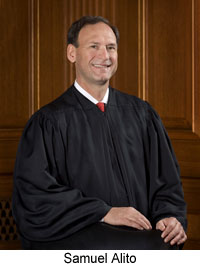BY LINDA BENTLEY | JUNE 25, 2014
When it comes to cell phones SCOTUS says ‘get a warrant’
‘We cannot deny that our decision today will have an impact on the ability of law enforcement to combat crime’
![]()
WASHINGTON – This morning, June 25, the Supreme Court of the United States issued a unanimous opinion, stating, “Our answer to the question of what police must do before searching a cell phone seized incident to an arrest is accordingly simple – get a warrant.”
 The opinion of the court, delivered by Chief Justice John Roberts, reviewed two cases raising a common question: whether the police may, search digital information on a cell phone seized during an arrest without a warrant.
The opinion of the court, delivered by Chief Justice John Roberts, reviewed two cases raising a common question: whether the police may, search digital information on a cell phone seized during an arrest without a warrant.
In one case, David Riley was arrested after being pulled over for expired registration tags and, in the course of the stop, the officer learned Riley’s license was also suspended.
Pursuant to police department policy, the officer impounded Riley’s car and another officer conducted an inventory search of his vehicle.
Riley was arrested for possession of concealed and loaded firearms after a search turned up two concealed and loaded handguns under the hood.
Incident to his arrest, an officer searched Riley, found items associated with the Bloods street gang and seized a “smart phone” found in Riley’s pants pocket.
 The officer accessed information on the cell phone and noticed some information, possibly text messages or contacts, contained the letters CK, which he believed to stand for “Crip Killers,” a slang term for members of the Bloods gang.
The officer accessed information on the cell phone and noticed some information, possibly text messages or contacts, contained the letters CK, which he believed to stand for “Crip Killers,” a slang term for members of the Bloods gang.
About two hours after Riley’s arrest, a detective specializing in gangs examined the contents of Riley’s phone more extensively.
The detective testified he “went through” Riley’s phone “looking for evidence, because … gang members will often video themselves with guns or take pictures of themselves with the guns.”
Particular files that caught the detective’s eye included videos of young men sparring while someone yelled “Blood” in encouragement.
Police also found photographs of Riley standing in front of a car they suspected to be involved in a shooting a few weeks earlier.
Riley was subsequently charged in connection with that shooting with firing at an occupied vehicle, assault with a semiautomatic firearm and attempted murder.
In arguing the case, the state alleged Riley committed those crimes for the benefit of a criminal street gang, an aggravating factor that carries enhanced sentencing.
Prior to trial, Riley moved to suppress all evidence police obtained from his cell phone, claiming the searches of his phone violated the Fourth amendment, as they had been performed without a warrant and not otherwise justified.
The trial court rejected that argument.
Riley was convicted on all three counts and received an enhanced sentence of 15 years to life in prison. The California Court of Appeals affirmed the lower court’s ruling and the California Supreme Court denied Riley’s petition for review.
The second case involved Brima Wurie, whom police officers observed making an apparent drug sale from a car.
Wurie was subsequently arrested and taken to the police station, where they seized two cell phones.
The one at issue in this case was a flip phone with a smaller range of features than a smart phone.
Several minutes after arriving at the station, officers noticed the phone was repeatedly receiving calls from a source identified on the phone as “my house” on the phone’s external screen. Later, they opened the phone and saw a photograph of a woman and a baby set as the phone’s wallpaper. They pressed one button on the phone to access the call log, then another to determine the phone number associated with the “my house” label.
Officers then used an online directory to trace the phone number to an apartment building.
When officers arrived at the apartment building they saw Wurie’s name on the mailbox and saw a woman through a window resembling the photograph on Wurie’s phone.
Officers secured the building while obtaining a search warrant.
Upon executing the warrant, they found and seized 215 grams of crack cocaine, marijuana, drug paraphernalia, a firearm and ammunition, and cash.
Wurie was charged with distributing crack cocaine, possessing crack cocaine with intent to distribute, and being a felon in possession of a firearm and ammunition.
Wurie filed a motion to suppress the evidence obtained from the search of his apartment, citing it was performed through an unconstitutional search of his cell phone.
The district court denied his motion.
Wurie was subsequently convicted on all three counts and sentenced to 262 months in prison.
In a divided panel, the First Circuit Court of Appeals reversed the district court’s denial of Wurie’s motion to suppress and vacated his convictions for possession with intent to distribute and possession of a firearm as a felon.
The court held that cell phones differed from other physical possessions that may be searched incident to arrest without a warrant because of the amount of personal data they contain and the negligible threat they pose to law enforcement personnel.
Citing the Fourth Amendment, Roberts quoting from Brigham City v. Stuart, said as the text makes clear, “the ultimate touchstone of the Fourth Amendment is ‘reasonableness.’”
Roberts, who went on to quote from other cases, wrote, “Our cases have determined that ‘[w]here a search is undertaken by law enforcement officials to discover evidence of criminal wrongdoing . . . reasonableness generally requires the obtaining of a judicial warrant,’” and stated, “Such a warrant ensures that the inferences to support a search are ‘drawn by a neutral and detached magistrate instead of being judged by the officer engaged in the often competitive enterprise of ferreting out crime.’”
Roberts stated, “One of the most notable distinguishing features of modern cell phones is their immense storage capacity,” pointing out most people cannot “lug around” every piece of mail received, every picture taken or every book or article they have read – nor would they have reason to do so.
If they did, Roberts said they would have to drag a trunk behind them, in a size that would require a search warrant, rather than a container the size of a pack of cigarettes.
Roberts touched on the element of pervasiveness that characterizes cell phones but not physical records and stated, “Prior to the digital age, people did not typically carry a cache of sensitive personal information with them as they went about their day. Now it is the person who is not carrying a cell phone, with all that it contains, who is the exception.”
Roberts stated, “We cannot deny that our decision today will have an impact on the ability of law enforcement to combat crime. Cell phones have become important tools in facilitating coordination and communication among members of criminal enterprises, and can provide valuable incriminating information about dangerous criminals. Privacy comes at a cost.
“Our holding, of course, is not that the information on a cell phone is immune from search; it is instead that a warrant is generally required before such a search, even when a cell phone is seized incident to arrest.”
Justice Samuel Alito wrote a partially concurring opinion in which he stated, due to the quantity of information stored on a cell phone, some of which is highly personal, “This calls for a new balancing of law enforcement and privacy interests.”
However he noted the court’s ruling in favor of privacy interests with respect to all cell phones and all information found on them leads to anomalies.
Alito stated the court’s broad holding favors information in digital form over information in hard copy form and provided the following example:
“Suppose that two suspects are arrested. Suspect number one has in his pocket a monthly bill for his land-line phone, and the bill lists an incriminating call to a long-distance number. He also has in his a wallet a few snapshots, and one of these is incriminating. Suspect number two has in his pocket a cell phone, the call log of which shows a call to the same incriminating number. In addition, a number of photos are stored in the memory of the cell phone, and one of these is incriminating. Under established law, the police may seize and examine the phone bill and the snapshots in the wallet without obtaining a warrant, but under the Court’s holding today, the information stored in the cell phone is out.”
Alito went on to say, although the court’s approach leads to anomalies, he did not see a workable alternative, noting law enforcement officers need clear rules with respect to searches incident to arrest.
Alito concluded legislatures, elected by the people, are in a better position to assess and respond to the changes in technology that have already occurred and those he says will almost certainly take place in the future.



